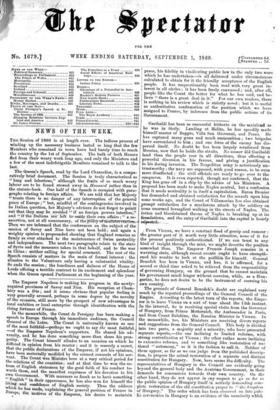NEWS . OF THE WEEK.
THE Session of 1860 is at length over. The tedious process of winding up the necessary business lasted. so long that the few Members who remained in town have had barely time to reach the country by the 1st of September. The bulk of both Houses fled from their weary work long ago, and only the Ministers and a few of the most indefatigable Members remained to talk to the last.
The Queen's Speech, read by the Lord Chancellor, is a compa- ratively brief document. The Session is truly characterized as " long and laborious," although the fruits of so much weary labour are to be found stowed away in Hansard rather than in the statute-book. One half of the Speech is occupied with para- graphs relating to foreign affairs. We are told that her Majesty " trusts there is no danger of any interruption of the general peace of Europe ; " but, mindful of the contingencies involved in he Italian question, her Majesty's advisers do not forget to poiutt out that they may_be avoided "if no foreign powers interfere,"
and "if the Italians 'to-sattlo their own affairs ; " a re- assertion, not at all unnecessary, of thell'511trofiro Then we are informed that the conferences on the subject of the oession of Savoy and Nice have not been held ; and again a weighty opinion is propounded showing that England remains as firmly as ever attaohed to the maintenance of Swiss neutrality and independence. The next two paragraphs relate to the state of Syria and the measures taken in that behalf, and to the war in China ; neither calling for special comment. The rest of the Speech consists of matters in the main of formal interest ; the allusion to the Volunteers only having a substantial vitality. So ends the session ; the loneliness and dulness of the House of Lords offering -a terrible contrast to its excitement and splendour when the Queen opened Parliament at the beginning of the year.


























